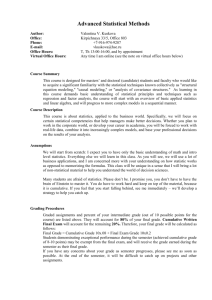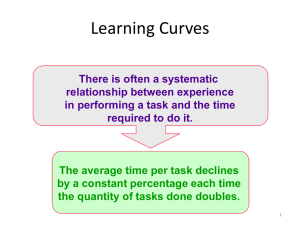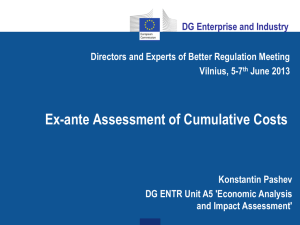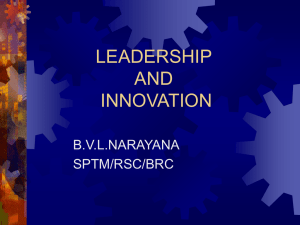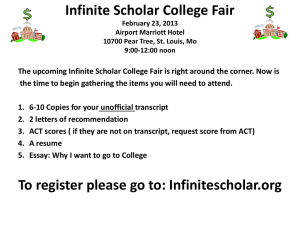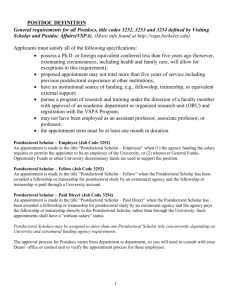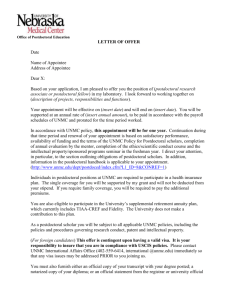POST DOCTORAL SCHOLARS
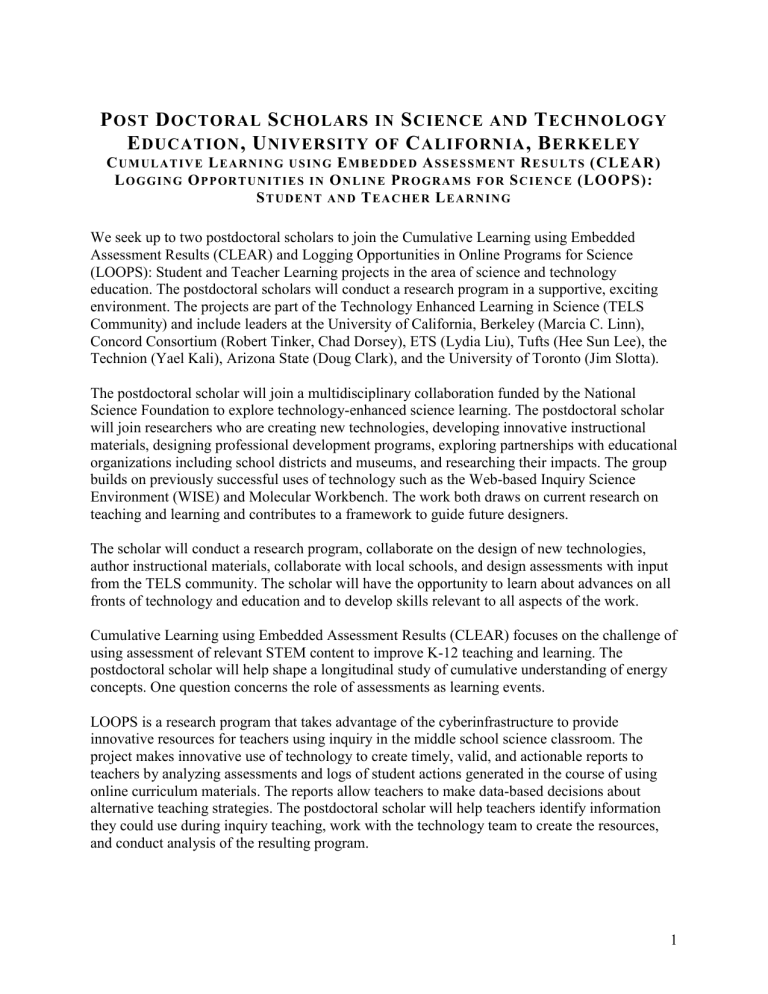
P
OST
D
OCTORAL
S
CHOLARS IN
S
CIENCE AND
T
ECHNOLOGY
E
DUCATION
, U
NIVERSITY OF
C
ALIFORNIA
, B
ERKELEY
C
U M U L A T I V E
L
E A R N I N G U S I N G
E
M B E D D E D
A
S S E S S M E N T
R
E S U L T S
(CLE AR)
L
O G G I N G
O
P P O R T U N I T I E S I N
O
N L I N E
P
R O G R A M S F O R
S
C I E N C E
(LOO PS):
S T U D E N T A N D T E A C H E R L E A R N I N G
We seek up to two postdoctoral scholars to join the Cumulative Learning using Embedded
Assessment Results (CLEAR) and Logging Opportunities in Online Programs for Science
(LOOPS): Student and Teacher Learning projects in the area of science and technology education. The postdoctoral scholars will conduct a research program in a supportive, exciting environment. The projects are part of the Technology Enhanced Learning in Science (TELS
Community) and include leaders at the University of California, Berkeley (Marcia C. Linn),
Concord Consortium (Robert Tinker, Chad Dorsey), ETS (Lydia Liu), Tufts (Hee Sun Lee), the
Technion (Yael Kali), Arizona State (Doug Clark), and the University of Toronto (Jim Slotta).
The postdoctoral scholar will join a multidisciplinary collaboration funded by the National
Science Foundation to explore technology-enhanced science learning. The postdoctoral scholar will join researchers who are creating new technologies, developing innovative instructional materials, designing professional development programs, exploring partnerships with educational organizations including school districts and museums, and researching their impacts. The group builds on previously successful uses of technology such as the Web-based Inquiry Science
Environment (WISE) and Molecular Workbench. The work both draws on current research on teaching and learning and contributes to a framework to guide future designers.
The scholar will conduct a research program, collaborate on the design of new technologies, author instructional materials, collaborate with local schools, and design assessments with input from the TELS community. The scholar will have the opportunity to learn about advances on all fronts of technology and education and to develop skills relevant to all aspects of the work.
Cumulative Learning using Embedded Assessment Results (CLEAR) focuses on the challenge of using assessment of relevant STEM content to improve K-12 teaching and learning. The postdoctoral scholar will help shape a longitudinal study of cumulative understanding of energy concepts. One question concerns the role of assessments as learning events.
LOOPS is a research program that takes advantage of the cyberinfrastructure to provide innovative resources for teachers using inquiry in the middle school science classroom. The project makes innovative use of technology to create timely, valid, and actionable reports to teachers by analyzing assessments and logs of student actions generated in the course of using online curriculum materials. The reports allow teachers to make data-based decisions about alternative teaching strategies. The postdoctoral scholar will help teachers identify information they could use during inquiry teaching, work with the technology team to create the resources, and conduct analysis of the resulting program.
1
QUALIFICATIONS
Candidates should have a background in the natural sciences, engineering, mathematics, or computer science and a Ph. D. in education, psychology, mathematics, natural science, engineering, computer science, or a related discipline. Experience in the design, implementation, and analysis of science curricula and assessment is an asset. Applicants should demonstrate ability to work on a team, skill in collaborating with precollege teachers and students, interest in working in partnerships to develop instruction, and ability to succeed in a school setting.
The ideal candidate will start in the Spring of 2009. The positions are for one year with possible renewal for a second year.
TO APPLY
Send CV, statement of purpose, one or more academic papers, and a list of people we might contact for letters of recommendation March 15, 2009 to:
E-mail: mclinn@berkeley.edu,
Or mail materials to:
Marcia C. Linn
University of California at Berkeley
Graduate School of Education,
4611 Tolman Hall
Berkeley, California 94720-1670
The University of California is an equal opportunity, affirmative action employer.
Abstracts of projects
Cumulative Learning using Embedded Assessment Results (CLEAR)
Cumulative Learning using Embedded Assessment Results (CLEAR) focuses on the challenge of using assessment of relevant STEM content to improve K-12 teaching and learning.
CLEAR takes advantage of new technologies and research findings to investigate ways that science assessments can both capture and contribute to cumulative, integrated learning of standards-based concepts in middle school courses. The project will research new forms of assessment that document students’ accumulation of knowledge and also serve as learning events. CLEAR will use cohort and randomized classroom comparisons to determine what combinations of instruction and assessment enable middle school students to gain cumulative understanding of energy concepts in science. CLEAR will study whether the project’s approach when used in one course impacts progress in the next. The project will put design principles from across the field to the test by determining which instruction and assessment strategies encourage cumulative understanding and help learners develop integrated ideas about science.
Intellectual Merit.
There is an urgent need to develop accurate student assessments that measure cumulative knowledge while eliminating the disruptions caused by tests. By measuring students’ developing understanding and ongoing efforts to make sense of new materials, the project will be
2
able to foster coherent understanding. The project will do this by making assessment an integral part of computer-based curricula.
Broader Impact. By aligning assessment and instruction around the goal of promoting understanding, the project will demonstrate how to improve learning outcomes for any STEM course. The project will also make courses more effective and efficient by converting assessment from a time-wasting, curriculum-limiting chore into an integral part of learning that fosters the accumulation of concepts across topics and grades. The results of the proposed research will have an important bearing on the design of effective all-electronic media, which are playing a more and more central role in learning as technology continues to drop in price.
The project is designed to have a major impact by undertaking the kind of careful, statistically valid research design that leads to reproducible results that can support policy. The project will be able to tailor instruction to specific learners, increasing the impact on students at risk for failure. The partners will continue their practice of widely disseminating findings, materials, and open source software through reviewed papers, popular articles, talks, workshops, its website, and newsletters.
Logging Opportunities in Online Programs for Science (LOOPS)
This proposal for a large-scale project is submitted to the DR-K12 category B, “Development of
Resources and Tools” sub-category 2, “Instruction of K-12 Students and Teachers.” LOOPS is a national program that uses the cyberinfrastructure to provide innovative resources that support inquiry in the middle school science classroom. The project makes innovative use of technology to create timely, valid, and actionable reports to teachers by analyzing assessments and logs of student actions generated in the course of using online curriculum materials. The reports allow teachers to make data-based decisions about alternative teaching strategies. The technology will support student collaborations and the assignment of different learning activities to groups, an essential function needed for universal design for learning (UDL). Project research is designed to quantify both student and teacher learning as a result of using the system.
Intellectual Merit.
LOOPS addresses the Grand Challenges by incorporating cutting-edge tools and models and by improving student assessment through sophisticated logging technology. The project also meets other DR-K12 priorities by incorporating UDL strategies and making extensive use of the cyberinfrastructure. Today’s classroom computers can execute sophisticated simulations of complex systems such as computational dynamics and climate models. Similarly, real-time data acquisition and analysis from dozens of kinds of probes with excellent ranges and accuracies is now within reach of any classroom with commercial computers and probeware.
These models and tools can greatly extend the range and depth of inquiry-based learning at early grades through real and simulated environments. The central challenge to wider use of these resources is that students often lack the inquiry skills to experiment meaningfully and to interpret the results, and that teachers need special talents to impart those skills. The proposed materials address these challenges by giving teachers innovative assessments and new options.
The project is a collaborative partnership that involves physical scientists, learning scientists, educators, and TELS, an established NSF-funded Center for Teaching and Learning. The proposed researchers have a 25-year history of collaboration that has produced influential and respected research in science education. The project is based on an extensive body of research and development in educational technology and represents a significant and innovative advance.
Broader Impacts. Guided student inquiry with models and tools is likely to be the greatest contribution of technology to STEM education. It is particularly challenging to provide this
3
promising approach in schools serving low-income communities, where there is great diversity in the student body, limited resources, intermittent technology, and an itinerant faculty. Accurate, timely reports on student progress help teachers track every student and are particularly important for under-performing students who might otherwise be overlooked. The boost that technology promises to STEM education cannot be ignored in these schools because their students are most in need of quality education that can create new opportunities. And we must be prepared for the near future when computers will cost under $100 and every child can have one.
For these reasons, we develop our most promising educational technologies in these environments and conduct our research there to ensure that our approaches can work in all schools. Our dissemination and commercialization strategies will ensure that all schools will have access to project products.
4
